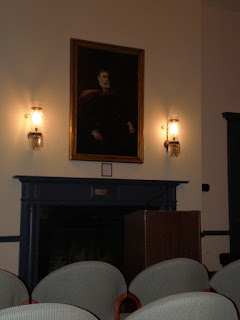Ninth Annual Abraham Kuyper Prize Lecture: Dr. Richard J. Mouw
Note: The below are my notes from Dr. Mouw’s lecture. Hopefully they are an accurate representation, but I’m sure that I have shaped the content a bit with my reception. I hope that you find the material stimulating. For more information on the Kuyper Consultation going on today and tomorrow here at PTS, check out the Kuyper Center website . ============================ Princeton Theological Seminary, Miller Chapel - Thursday, March 29, 2007 at 7:30 PM “Culture, Church, and Civil Society: Kuyper for the New Century” David Novak compared Barth to those who want Christianity to retreat into sectarian enclaves, and sees this as a weakness in Barth. He wished Barth had read Abraham Kuyper and learned from him, although Novak admits that Kuyper wasn’t in Barth’s theological league, witch is true. But there are other theological leagues, and Kuyper stands out as a giant in the league of public theology. Most of his output was produced on the run and his theological work was done closel...

